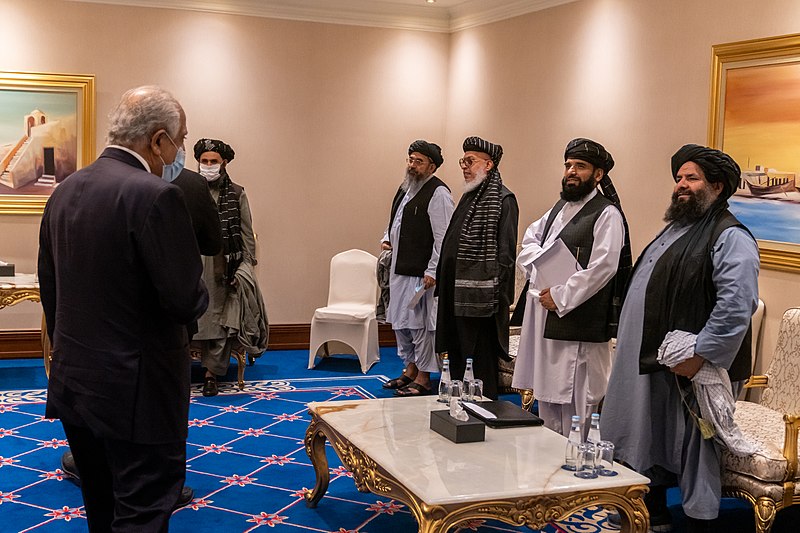Evacuations from Afghanistan hit a pause in the past few months, with many Afghans looking to flee the country remaining. Qatar has recently come to an agreement with the insurgent group in restarting evacuations from the country.
Qatari Foreign Minister Sheikh Mohammed bin Abdulrahman al-Thani said Monday that Qatar has reached an agreement with the Taliban in operating two chartered Qatar Airways flights per week. This would allow thousands of Afghans and foreign nationals looking to flee the country in months since the US withdrawal back in August, with the Taliban rapidly taking control of Afghanistan afterward.
This follows a previous report last week that the US plans to restart evacuations and resettlement efforts again. Qatar has already been sporadically operating chartered flights from Kabul back in September. The flights stopped in December following a dispute with the insurgent group over which passengers are allowed on the flights.
The first evacuation flight took place on January 26 from Kabul bound for Doha, according to Reuters.
This also comes as Qatar’s emir Sheikh Tamim bin Hamad al-Thani visited Washington to meet with US President Joe Biden at the White House. Qatar’s role as an intermediary between Washington and the Taliban has been praised by US officials. The US announced back in November that Qatar would become its representative in Afghanistan.
The US and other western nations have been facing pressure to ramp up evacuations from Afghanistan, especially of Afghans who have worked for the foreign military forces and are at risk of reprisals from the insurgent group. Advocates said that thousands of Afghans who worked with the US military still remain in the country.
At the same time, the US announced that international banks may now transfer money to Afghanistan for humanitarian purposes, while aid groups are now allowed to pay teachers and healthcare workers at government-backed institutions without fear of breaching sanctions imposed on the insurgent group. The US Treasury Department provided guidance on sanctions exemptions that were issued back in September and in December for humanitarian work in Afghanistan.
The UN previously warned that more than half of the country’s population are facing extreme hunger, with the economy, education, and social services systems on the brink of collapse.



 New York Legalizes Medical Aid in Dying for Terminally Ill Patients
New York Legalizes Medical Aid in Dying for Terminally Ill Patients  Pentagon Ends Military Education Programs With Harvard University
Pentagon Ends Military Education Programs With Harvard University  Missouri Judge Dismisses Lawsuit Challenging Starbucks’ Diversity and Inclusion Policies
Missouri Judge Dismisses Lawsuit Challenging Starbucks’ Diversity and Inclusion Policies  Trump Allows Commercial Fishing in Protected New England Waters
Trump Allows Commercial Fishing in Protected New England Waters  Iran–U.S. Nuclear Talks in Oman Face Major Hurdles Amid Rising Regional Tensions
Iran–U.S. Nuclear Talks in Oman Face Major Hurdles Amid Rising Regional Tensions  Trump Signs “America First Arms Transfer Strategy” to Prioritize U.S. Weapons Sales
Trump Signs “America First Arms Transfer Strategy” to Prioritize U.S. Weapons Sales  India–U.S. Interim Trade Pact Cuts Auto Tariffs but Leaves Tesla Out
India–U.S. Interim Trade Pact Cuts Auto Tariffs but Leaves Tesla Out  U.S. Announces Additional $6 Million in Humanitarian Aid to Cuba Amid Oil Sanctions and Fuel Shortages
U.S. Announces Additional $6 Million in Humanitarian Aid to Cuba Amid Oil Sanctions and Fuel Shortages  Nighttime Shelling Causes Serious Damage in Russia’s Belgorod Region Near Ukraine Border
Nighttime Shelling Causes Serious Damage in Russia’s Belgorod Region Near Ukraine Border  TrumpRx Website Launches to Offer Discounted Prescription Drugs for Cash-Paying Americans
TrumpRx Website Launches to Offer Discounted Prescription Drugs for Cash-Paying Americans  Trump Signs Executive Order Threatening 25% Tariffs on Countries Trading With Iran
Trump Signs Executive Order Threatening 25% Tariffs on Countries Trading With Iran  US Pushes Ukraine-Russia Peace Talks Before Summer Amid Escalating Attacks
US Pushes Ukraine-Russia Peace Talks Before Summer Amid Escalating Attacks  U.S. to Begin Paying UN Dues as Financial Crisis Spurs Push for Reforms
U.S. to Begin Paying UN Dues as Financial Crisis Spurs Push for Reforms  U.S. Lawmakers to Review Unredacted Jeffrey Epstein DOJ Files Starting Monday
U.S. Lawmakers to Review Unredacted Jeffrey Epstein DOJ Files Starting Monday  Trump Endorses Japan’s Sanae Takaichi Ahead of Crucial Election Amid Market and China Tensions
Trump Endorses Japan’s Sanae Takaichi Ahead of Crucial Election Amid Market and China Tensions  Ohio Man Indicted for Alleged Threat Against Vice President JD Vance, Faces Additional Federal Charges
Ohio Man Indicted for Alleged Threat Against Vice President JD Vance, Faces Additional Federal Charges  Trump Backs Nexstar–Tegna Merger Amid Shifting U.S. Media Landscape
Trump Backs Nexstar–Tegna Merger Amid Shifting U.S. Media Landscape 































